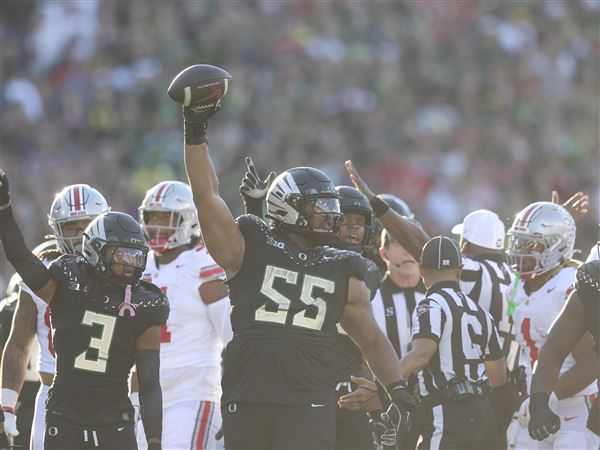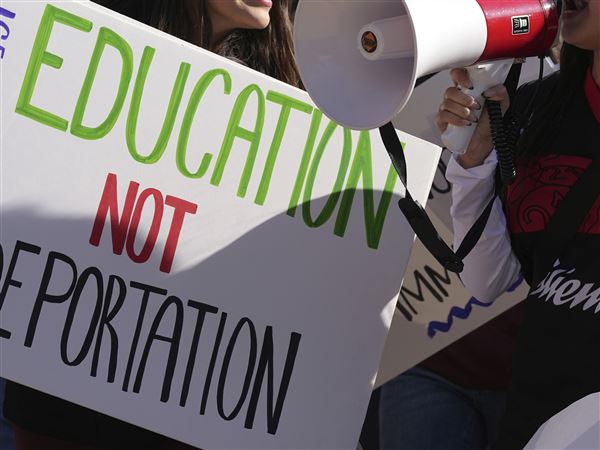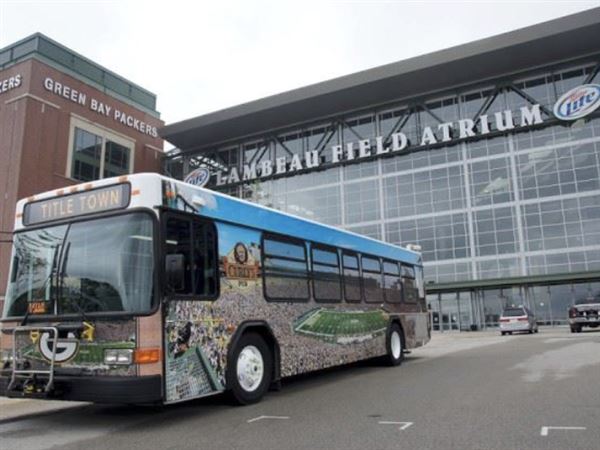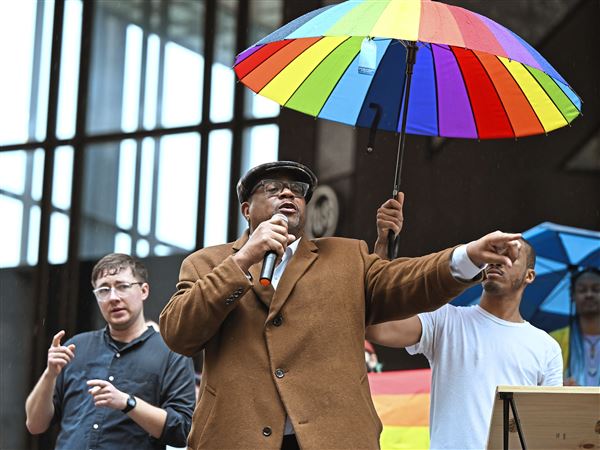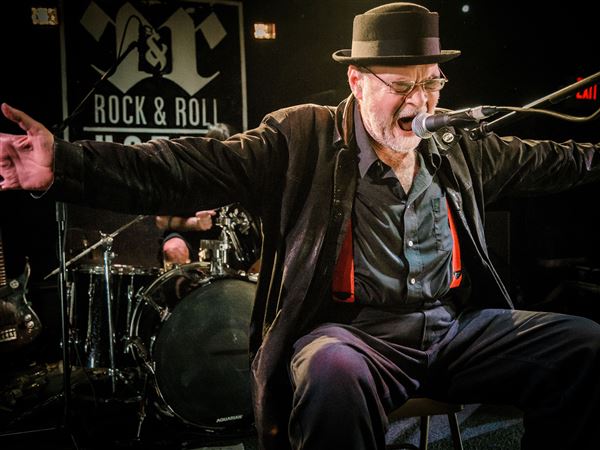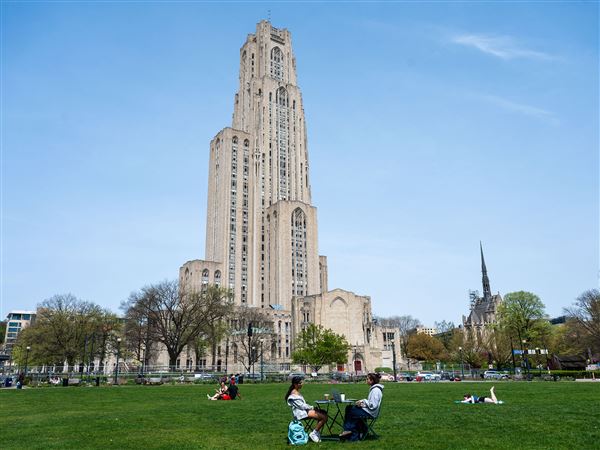Peter F. Flaherty, a pivotal figure in Pittsburgh politics who brought reform and charisma to city hall while challenging the city's party and business establishments, has died.

Pete Flaherty in a 1998 photo.
Click photo for larger image.
 Pete Flaherty: Four decades of public service
Pete Flaherty: Four decades of public serviceHis longtime adviser, Bruce Campbell, said Mr. Flaherty died of cancer yesterday at his home in Mt. Lebanon, surrounded by family.
In a public career that spanned four decades, Mr. Flaherty, 80, was three times the Democratic nominee for statewide office, served as deputy U.S. attorney general and was a county commissioner for 12 years. But by far his most profound impact came as mayor of Pittsburgh, an office he captured proclaiming himself "Nobody's Boy," distancing himself from the Democratic organization that had produced every Pittsburgh mayor since the Great Depression.
Mr. Flaherty's 1970 inauguration was bracketed by the deaths of David L. Lawrence, the former mayor and governor, and Richard King Mellon, the powerful business leader who, in a unique and productive partnership with Lawrence, helped to remake Pittsburgh in the years after World War II.
Mr. Flaherty's maverick candidacy and administration recognized and exploited dissatisfaction with the top-down civic structure those men had created. His rise also reflected larger national political currents in an era marked by the increasing assertiveness of civil rights and community groups outside the traditional political order.
As mayor, Mr. Flaherty won overwhelming public popularity, but continued to antagonize established interests as he emphasized a streamlined and reformed approach to government. He trimmed the city payroll and repeatedly cut taxes while shifting development priorities toward neighborhoods beyond the Downtown core.
"He was a very significant figure,'' said Joel Tarr, a Carnegie Mellon University historian. "He capitalized on the waves of unhappiness with the Pittsburgh Renaissance and, I think, also the fact that the '60s were such a traumatic decade ... he was a breath of fresh air at a time that it was required."
Morton Coleman, of the University of Pittsburgh's Institute of Politics, called Mr. Flaherty "a leader in understanding that the traditional organization was weakening and a new kind of personal politics was strengthening."
"He was a brilliant pioneer in the new fiscal populist mayoral style," said Terry Nichols Clark, a scholar on urban issues at the University of Chicago, who studied Mr. Flaherty's administration. "He invented a whole style of politics ... he came from a left Democratic Party background and he combined it with fiscal conservatism, fighting business, fighting labor unions, fighting interests groups of all sorts."
Mr. Flaherty traveled a bumpier political road in the years after his successes as mayor. He was unable to transfer his Pittsburgh popularity statewide, losing two elections for the U.S. Senate and one for governor. In a brief tour in President Carter's Justice Department, he never established a rapport with the Georgia network that came to Washington with Carter.
Mr. Flaherty ended his public career with three productive but, by the standards of his dynamic tenure as mayor, relatively low-key terms as county commissioner, where he served as junior partner to veteran Commissioner Tom Foerster.
Entry to politics
Mr. Flaherty was the child of Irish immigrants. His father, also named Peter, emigrated from county Galway in 1909 and settled in San Francisco. After serving in World War I, the elder Flaherty returned to California but was called to Pittsburgh in 1919 after his brother, Coleman, and his wife died in the flu pandemic that swept the globe after World War I, leaving their children orphans.
In Pittsburgh, Peter met and married another Galway native, Anne O'Toole. The elder Flaherty worked as a streetcar conductor and operator. The couple also operated a small grocery store about a block from their home in the North Side, then a polyglot community of Irish, Italians, Germans and African-Americans. The future mayor was born in their home on Alpine Avenue on June 24, 1924.
He attended St. Peter's, a Catholic elementary school, went on to Latimer Middle School and graduated from Allegheny High School in the first year of World War II.
In an interview for the University of Pittsburgh's oral history archives, Mr. Flaherty recalled that they were a typically, for the time, devout Irish Catholic family. The two brothers and five sisters knelt together to say the rosary every night. Mr. Flaherty was an altar boy at St. Peter's. Throughout their school years, the children helped out in what for them was literally a mom-and-pop grocery store.
After high school, in the middle of World War II, Mr. Flaherty joined the Army Air Corps and was trained as a navigator. He shipped out to the Pacific in the last summer of the war, joining a B-29 squadron based in Guam. His unit concentrated on Japanese oil refineries in 15-hour missions across the Pacific.
After the war, Mr. Flaherty returned to Pittsburgh and, like thousands of his contemporaries, went to college on the GI Bill. He attended Carlow University, then known as Mount Mercy College, for two years and then enrolled at Notre Dame Law School.
Mr. Flaherty's parents had moved to Mt. Lebanon during the war and he moved in with them after his return from the Pacific. He got his political baptism shortly thereafter, running unsuccessfully for Mt. Lebanon school board as a Republican.
After graduating from Notre Dame and passing the bar exam, Mr. Flaherty got a job as an assistant district attorney under Democratic District Attorney Edward Boyle.
After laboring through a string of fairly anonymous cases, Mr. Flaherty attracted attention prosecuting what was known as the "free work" case, in which a handful of city workers were accused of performing private work on city time. That newfound prominence led to Mr. Flaherty's embrace by the organization that he would later spurn.
Joseph Barr, successor to the legendary Lawrence, was mayor at the time. Mr. Flaherty recalled that, at one point in the early 1960s, Barr talked to him about the job of city public safety director. Mr. Flaherty wasn't interested in that post, but later leapt when the Barr administration approached him about running for City Council.
By then he was wading deeper into politics. In 1964, he had worked as an advance man for Sen. Hubert Humphrey when he was running for vice president with Lyndon Johnson. Mr. Flaherty had developed ties with Barr's chief aide, Aldo Colautti, during the free work case. And the council seat he was tapped for was held by an Irishman. During that soon-to-end era, the committee of Democratic insiders who anointed candidates followed what was known as Balkan succession, with council seats apportioned to preserve an ethnic mix among the officeholders.
Mr. Flaherty was elected in 1965 and sworn in in 1966. The next year, some members of the Democratic organization were determined to replace the two Democratic incumbents on the Allegheny County Board of Commissioners, largely because of the incumbents' reluctance to work with the city on development projects. In a recent interview, Mr. Flaherty recalled that Barr called him at home one evening and asked him to run on a ticket with Leonard Staisey. Mr. Flaherty refused.
"I got the feeling that I was just window dressing, that Staisey was the man," Mr. Flaherty said. "It hit me between the eyes and I just rejected it out of hand."
The second spot on that ticket went to Foerster, then a state representative. Mr. Flaherty would soon run for a more prominent office, but the offer is noteworthy given the intersection of Mr. Flaherty's and Foerster's careers years later.
In 1968, again as a lieutenant for Humphrey, Mr. Flaherty attended the ill-fated Democratic convention in Chicago, where demonstrators battled police in Grant Park. As a Humphrey partisan, Mr. Flaherty was working for the party establishment against the insurgent candidacy of Sen. Eugene McCarthy. But his experience there, after a year of assassinations and urban riots, prodded his political evolution.
"I think it made me realize that the party's divided," Mr. Flaherty told an interviewer. "There's room in the party for dissent, which there never was before, or which there was very little of. So, in that sense, it had an effect on me."
As that year continued in Pittsburgh, there was uncertainly over whether Barr would seek another term as mayor. There also was widespread speculation that if he did step down, he and the party organization would anoint Mr. Flaherty as his successor. In an interview last year, however, Mr. Flaherty said that he never got that assurance or even that impression from Barr himself. Mr. Flaherty, feeling increasingly estranged from the party organization, instead embarked on the campaign that would remake the political map of Pittsburgh.
'Nobody's Boy'

Mayor Joseph Barr, left, City Council candidate Flaherty and former mayor and Gov. David L. Lawrence at opening campaign rally, Downtown, in 1965.
Click photo for larger image.

Flaherty with his wife, Nancy, after victory in the 1969 mayor's race.
Click photo for larger image.
Through the latter part of 1968, Mr. Flaherty became an increasingly vocal critic of the Barr administration, calling his budget unbalanced and opposing an administration proposal for the taxation of hospitals and other nonprofit institutions. Finally, Mr. Flaherty declared his candidacy for the Democratic nomination. With the trademark slogan "Nobody's Boy" he flaunted his independence from the party organization.
Barr announced that he would leave office, so the organization turned to Harry Kramer, then a judge on Common Pleas Court. Mr. Flaherty's candidacy embodied and capitalized on the rising independent spirit of the late '60s. Kramer attacked him, telling one rally, "There is a strange pattern when you analyze it -- the Students for a Democratic Society, the New Left, and my most vocal opponent."
That caricature would prove far from the truth about the fiscally prudent policy maker that emerged over Mr. Flaherty's career.
"In many ways, he was a populist, but a cautious and conservative populist," said Coleman. "He was not a big-government person."
Mr. Flaherty trounced Kramer and the organization with 62 percent of the Democratic vote. Republicans, who had courted Mr. Flaherty for their own ticket, saw in the divided party an opportunity to capture an office that they hadn't held in four decades. The GOP ran the respected John Tabor and poured more than $400,000 into his campaign, an enormous sum for the times.
Mr. Flaherty continued to defy the Democratic establishment. As a peace offering, the party organization printed thousands of Flaherty stickers and sent them to his headquarters. The next day, the newspapers ran photographs of Mr. Flaherty and his wife, Nancy, throwing the stickers into the trash.
The local papers were filled with pictures of the couple that year. The repeated images of Mr. Flaherty, tall, broad-shouldered and handsome, and Nancy, a former homecoming queen, reinforced the youthful, energetic image that bolstered Mr. Flaherty's political appeal. Years later the couple would divorce. In 1998, Mr. Flaherty married Charlene Flaherty, with whom he lived in their Mt. Lebanon home at the time of his death.
Mr. Flaherty, though outspent by a margin of more than 4 to 1, nonetheless cruised to a landslide victory in the 1969 election, launching an administration that would permanently transform Pittsburgh government.
"We weren't afraid of getting things done," recalled Campbell, a key adviser who was one of a team of young people, most new to government, whom Mr. Flaherty brought into the City-County Building.
In an interview last year, Mr. Flaherty saw that personnel roster as his greatest legacy. In addition to Campbell, it included Louise Brown, later a president of Chatham College; David O'Laughlin, developer and member of the city's fiscal oversight board; Robert Paternoster, a respected urban planner; and Robert Colville, his public safety director, later Allegheny County district attorney and now a judge of Common Pleas Court.
Campbell's first job was director of lands and buildings.
"When I took over there were spittoons in city hall," he said. "There was a job in City Council called spittoon cleaner."
During the Flaherty administration, the city's payroll dropped from roughly 7,000 to less than 5,000, while Mr. Flaherty repeatedly cut property and wage taxes in a city that had been losing population for two decades.
"Pete's great strength was that he was the first mayor to recognize the changing demographics of the city and the need to hone it back to reflect that reality," said David Donahoe, executive director of the Allegheny Regional Asset District, who was a senior aide to Mr. Flaherty's successor, the late Mayor Richard Caliguiri. "That's the kind of thing that stirs a lot of resentment, but it was an important step that someone had to take."
Mr. Flaherty was portrayed as hard-hearted for cutting the number of cleaning ladies in city hall. He insisted, however, that they were only working four hours a day while being paid for eight.
The administration attracted much better publicity in a crucial face-off with the Teamsters Union. A project to replace the city's water meters employed two-man crews, a plumber to do the actual work and a Teamster to drive the truck.
"I'd gotten rid of my own chauffeur, so I didn't see any reason why they needed drivers," Mr. Flaherty said.
The Teamsters struck citywide, halting, among other things, garbage collection.
Mr. Flaherty and some of his department heads went out and collected trash themselves. Television pictures of their labors were broadcast nationwide, enhancing Mr. Flaherty's public support and political leverage.
"I would go out into the community and they would say, 'Stand your ground,' " Mr. Flaherty recalled.
"Pete had a genius at getting coverage,'' said Campbell.
No business as usual
Mr. Flaherty's independence from a business elite that was accustomed to a strong working relationship with city government was exemplified in the bitter, protracted fight over Skybus, an ambitious proposal for automated, rubber-wheeled trains on concrete guideways.
With an eye to making Pittsburgh "the Detroit of transit," the county transportation agency and Allegheny Conference, the business group that was heir to the longtime Lawrence-Mellon partnership, united behind Skybus.
Mr. Flaherty was most prominent among critics who assailed the cost, unmanned concept and route of the plan.
In their study "Four Decades of Public-Private Partnerships in Pittsburgh," CMU's Tarr and Shelby Stewman observed, "The position that had worked well with his predecessors -- 'Mr. Mayor, here's what we think you ought to do' -- did not work with Flaherty."
For a time, the Port Authority attempted to press ahead with work on Skybus, but Mr. Flaherty opposed it at every point.
Mr. Flaherty called the Port Authority board a creature of the business community. "The tone of the board toward public suggestions was to look upon such suggestions as minor intrusions," he said in one interview. "In my own case, it was as though I were interrupting the usual order of business ... their tone is not one of 'The public be damned' but rather 'We know best.'" Eventually, after years of conflict, a compromise was struck that spawned the light-rail system that now serves the South Hills.
Then and in recent interviews, Mr. Flaherty insisted that his position was not anti-business. He noted that he had made a point of visiting Richard King Mellon shortly before his death in 1970 to convey that message. Mr. Flaherty conceded, however, "It didn't go that well. [The reception] was kind of lukewarm.''
In his second term, Mr. Flaherty was able to compromise with a new Allegheny Conference chairman, Robert Dickey, on issues including construction of a new convention center Downtown. He noted that he worked with community and business interests on the development of Station Square.
Running for re-election in 1973, Mr. Flaherty easily defeated his Democratic primary opponent, then-Councilman Caliguiri, as Democrats heeded his call to "Re-Pete." Mr. Flaherty captured the Republican nomination as well with a sticker-based write-in campaign in which GOP voters agreed to "Stick With Pete."
During Mr. Flaherty's years in office, the Pittsburgh school board was struggling to craft a desegregation plan. At one hearing, Mr. Flaherty spoke out against busing as an element of the plan. In interviews, he said he strongly favored desegregation but opposed widespread busing as a tool to accomplish it. He later would say that his views were distorted in some contemporary accounts.
"The newspapers basically portrayed me as an anti-buser," he said. "The whole issue to them was busing, whether you were for school busing or against it. I was against massive school busing, not all school busing."
Mr. Flaherty boasted of his civil rights record. Campbell noted, for example, that he had been innovative in increasing minority representation on boards and commissions. His administration disbanded the police "tactical squads'' that stirred resentment in the black community with aggressive methods. He personally intervened to peacefully defuse an incendiary confrontation on the North Side after an elderly white woman shot a black youth.
"Pete drove over there himself, and he had the cops pull back and he walked the streets of Manchester,'' Campbell recalled.
Mr. Flaherty's busing statements sparked lingering resentment among some black leaders and other partisans of the desegregation plan, feelings that would be hurdles in Flaherty's political future.
3 statewide losses

Celebrating with brother Jim, left, after Jim's triumph in the county commissioners' race in 1975.
Click photo for larger image.

After winning two terms as mayor of Pittsburgh, Flaherty left in 1977 to take a post as deputy U.S. attorney general -- a short, frustrating assignment.
Click photo for larger image.
After his smashing re-election in 1973, the mayor tried to transfer his popularity statewide in a race that he later recalled as "probably a mistake." He scored a narrow victory in the primary for the Democratic nomination to challenge Republican Sen. Richard Schweiker. Schweiker easily defeated the Pittsburgh mayor in the general election at the same time that Democratic Gov. Milton Shapp won a comfortable re-election.
In the 1976 presidential race, Mr. Flaherty was the first Northeastern mayor to endorse Jimmy Carter, another Democrat who emphasized fiscal discipline while challenging traditional party power brokers. He was rewarded with the post of deputy attorney general, one that seemed an attractive new challenge to the former prosecutor.
But Attorney General Griffin Bell split the duties of the office with a new post -- associate attorney general -- which reduced its power.
Mr. Flaherty recalled that prior to his confirmation hearing, "[Sen.] Ted Kennedy invited me over to his office for lunch, and he told me not to take the job. 'You're going to be just a figurehead,' he said, because Georgians were installed in all the responsible positions. And he was right and I wish I had listened to him."
It proved a short, frustrating assignment for Mr. Flaherty. One indelible memory from the period came on March 9, shortly after Mr. Flaherty took office, when members of the Hanafi Muslim sect took 134 hostages and occupied three buildings, including the District Building, the equivalent of city hall, in the center of Washington. Mr. Flaherty was at the center of the tense negotiations that led to the release of the hostages and the surrender of their captors, after a siege of 39 hours.
Mr. Flaherty, who never established a rapport with Carter insiders, was relieved to leave Washington behind as he returned to Pennsylvania to enter the 1978 governor's race. He finished first among four Democrats in the primary, among them Robert P. Casey, the former auditor general who would go on to win two terms as governor years later.
Mr. Flaherty entered the general election much better-known than the GOP nominee, Dick Thornburgh. He had a huge lead in early polls, but a variety of factors helped Thornburgh whittle away.
In one bit of bad luck, Mr. Flaherty was saddled as a running mate with another Robert Casey, an Allderdice High School teacher who won on name confusion with the gubernatorial candidate from Scranton.
Mr. Flaherty had nothing to do with the homonym candidate but the result didn't help his popularity in Casey's Democratic base in northeastern Pennsylvania. Mr. Flaherty also had to overcome a cloud of scandal that hung over Pennsylvania due to multiple prosecutions of members of the Shapp administration.
Another intraparty hurdle presented itself in Philadelphia, where the controversial Mayor Frank Rizzo was seeking a change in the city charter to allow himself to run for a third term. Mr. Flaherty announced that he was opposed to the charter change, bringing the opposition of Rizzo's Democratic supporters. Rizzo was a racially polarizing figure, and his attempt to stay in office catalyzed an unprecedented turnout among black voters.
Thornburgh, through the intercession of Pittsburgh civil rights activist Nate Smith, managed to bask in an endorsement from the Rev. Jesse Jackson that was trumpeted widely in Philadelphia. Thornburgh, in a stunning showing for a Republican, carried the majority of Philadelphia's predominantly black wards, a result that held down Mr. Flaherty's lead in the Democratic stronghold. Overall, Thornburgh, who outspent Mr. Flaherty by a wide margin, won the state by roughly 230,000 votes.
Hoping that the third statewide run would be the charm, Mr. Flaherty won the Democratic nomination for U.S. Senate two years later, and faced Arlen Specter, another former prosecutor with a track record of statewide losses. It was Mr. Flaherty's strongest statewide showing, but it was not enough to overcome the GOP tide that rolled in with Ronald Reagan's 1980 victory over Mr. Flaherty's former boss, Carter.
Mr. Flaherty practiced law in Pittsburgh after that defeat, but decided in 1983 to run for Allegheny County commissioner.
"Oh, I missed it, I missed public service," Mr. Flaherty said of the decision. "It's been my life basically."
Mr. Flaherty hoped to lead the ticket but, while he won one of the three seats, his vote total was second to that of the veteran Foerster.
Foerster's more traditional political style offered a contrast to Mr. Flaherty's track record of disdain for organization insiders. The pair's initial partnership was tentative, but it evolved into a productive one, with achievements over their three shared terms including the completion of the new Pittsburgh International Airport terminals, the building of the four Kane centers for the elderly, and the massive jail complex along the Monongahela River.
Over the years, their professional collaboration became easier, but it never translated into a close personal relationship.
"We never had dinner together the whole time I was there," Mr. Flaherty recalled. "We spoke. We got along. But we never became close associates."

Richard Caliguiri, who succeeded Flaherty as mayor of Pittsburgh, met with him to offer his endorsement in the 1980 race for U.S. Senate.
Click photo for larger image.

County Commissioners Flaherty and Tom Foerster concede at Mitchell's Restaurant, Downtown, after losing the Democratic primary in 1995. The defeat marked the end of Flaherty's political career.
Click photo for larger image.
Mr. Flaherty and Foerster, the two very different North Side natives, were ousted from power in the Democratic primary of 1995, one that set the stage for a stunning Republican victory in the general election, ending six decades of Democratic control of county government.
With Charlene, Mr. Flaherty settled into retirement in Mt. Lebanon, just blocks from the house where his parents had moved during World War II. He battled cancer over the last months of his life, but still could be seen frequently striding the streets of Virginia Manor, nodding to acquaintances and strangers who invariably hailed him as "Pete."
Last summer, Mr. Flaherty spoke of the impact of his struggle with cancer.
"Of course it changes you," he said. "It makes you realize how unimportant you are and how important other people are, so there's a good side."
Asked his most important accomplishment, he said, "Oh, I think we changed the scene in city hall, from the old guard to a new, wide-open kind of administration. We put the city on a sound fiscal basis; we brought in new people."
In addition to his wife, Mr. Flaherty is survived by a daughter, Dr. Maggie Gurtner of Mt. Lebanon; four sons, Shawn, Peter and Brian of Pittsburgh, and Gregory of Los Angeles; a brother, Commonwealth Court Judge James Flaherty; five sisters, Sister Rita Flaherty of Pittsburgh, Margaret Moretti of Mt. Lebanon, Catherine Flaherty of Delray Beach, Fla., Helen Smith of Mt. Lebanon, and Patrice Mahon of Boynton Beach, Fla.; and eight grandchildren.
Visitation will be from 3 to 8 p.m. Thursday at Laughlin Memorial Chapel on Washington Road in Mt. Lebanon. A funeral Mass will be celebrated Friday morning, at a time yet to be determined, at St. Bernard Church in Mt. Lebanon.
First Published: April 19, 2005, 4:00 a.m.
